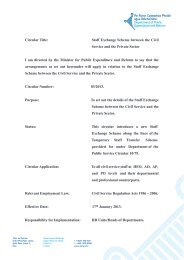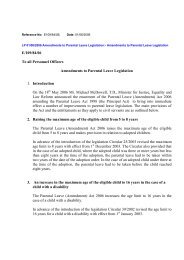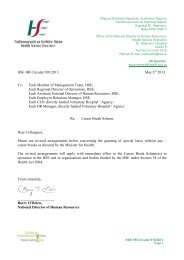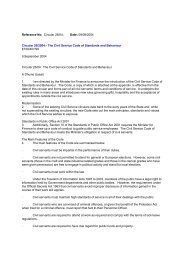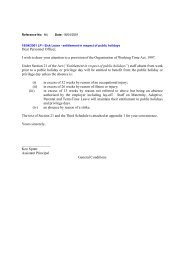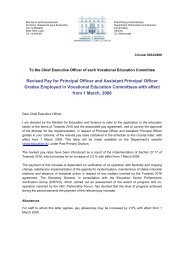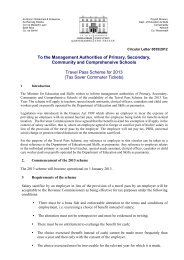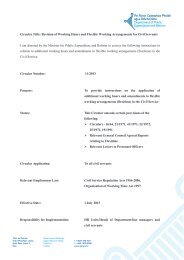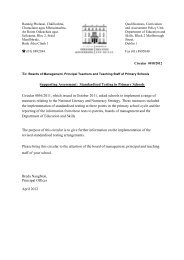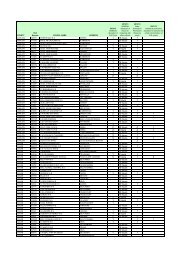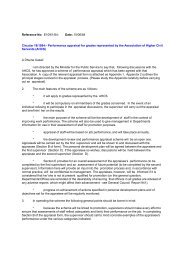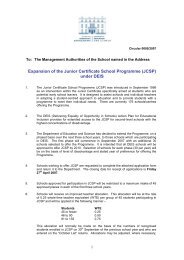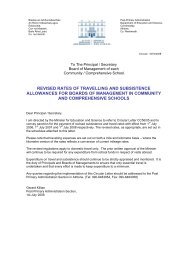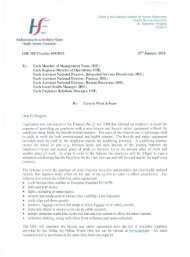Revised procedures for Exchequer Extra Receipts - Circulars
Revised procedures for Exchequer Extra Receipts - Circulars
Revised procedures for Exchequer Extra Receipts - Circulars
Create successful ePaper yourself
Turn your PDF publications into a flip-book with our unique Google optimized e-Paper software.
F7/40/06<br />
28 November, 2008<br />
A Dhuine Uasail<br />
Circular 28/08: <strong>Revised</strong> <strong>procedures</strong> <strong>for</strong> <strong>Exchequer</strong> <strong>Extra</strong> <strong>Receipts</strong><br />
1. I am directed by the Minister <strong>for</strong> Finance to outline revised <strong>procedures</strong> <strong>for</strong> the<br />
lodgement of <strong>Exchequer</strong> <strong>Extra</strong> <strong>Receipts</strong>. This Circular supersedes Circular 4/96<br />
and is being issued on foot the recent publication of a new edition of the<br />
Department of Finance publication "Public Financial Procedures".<br />
2. <strong>Exchequer</strong> <strong>Extra</strong> <strong>Receipts</strong> (EERs) are defined in Public Financial Procedures,<br />
Section C5.19 as<br />
"receipts that the Department of Finance directs must be credited directly to the<br />
<strong>Exchequer</strong> and cannot be retained by Depatiments <strong>for</strong> their own use. (If there is<br />
any doubt on how a particular receipt is to be treated, a specific direction should<br />
be sought from the Department of Finance.) Large receipts that have no direct<br />
connection with the Vote expenditure and 'windfall' receipts are brought to<br />
account in this way. They include items such as:<br />
• proceeds of important sales of property;<br />
• receipts on foot of surplus income or profits of State companies;<br />
• interest, dividends or capital repayments;<br />
• compensation"<br />
3. In practice, EERs may be classified into two types: (a) those remitted regularly,<br />
and (b) the irregular 'windfall' type.<br />
(a) Those remitted regularly include, <strong>for</strong> example, the sale of properties by the<br />
OPW or the refund of unused grant money.<br />
(b) The 'windfall' variety very often require a specific direction from the<br />
Department of Finance (usually Sectoral Policy Division) that the item be<br />
lodged as an EER. If there is any doubt on how a particular receipt is to be<br />
treated, a specific direction should be sought from the Department of Finance.<br />
4. The revised <strong>procedures</strong> <strong>for</strong>, the lodgement ofEERs are as follows:<br />
They should be transferred by internal funds transfer to the Sundry Moneys<br />
Deposit Account at the Central Bank (PMG Account 621 SMON). At the same<br />
time, a remittance advice should be sent to <strong>Exchequer</strong> Section (Department of<br />
Finance, Unit 2, Central Business Park, Tullamore, Co. Offaly), as well as to the<br />
Estimates Office (Department of Finance, Merrion Street, Dublin 2). If the<br />
Department of Finance has directed that a receipt is to be treated as an<br />
<strong>Exchequer</strong> <strong>Extra</strong> Receipt and the payment is delayed <strong>for</strong> more than a week after<br />
the issue of the direction, the Department or Office involved should notify the<br />
Estimates Office of the likely date oftransfer.<br />
TO: ALL ACCOUNTING OFFICERS
5. Best practice in relation to the transmission of Payable Orders generally<br />
I am also directed to bring to the attention of Departments and Offices the<br />
following best practices in relation to payments.<br />
o Payments to other Government Departments or Offices should always be<br />
made using the Internal Funds Transfer (IFT) facility on the PMG Intranet<br />
site. Such payments should never be made by payable order;<br />
o There should always be a letter, issued separately or otherwise, notifying the<br />
relevant Department or Office of the purpose of the payment;<br />
o Acknowledgements should be issued as a matter of course in respect of<br />
receipts from other Government Departments and Offices; and<br />
o<br />
Such acknowledgements should be used <strong>for</strong> the purposes of reconciliation<br />
by the office that issued the payment.<br />
Mise le meas<br />
Carmel Keane<br />
Head of Finance Directorate



